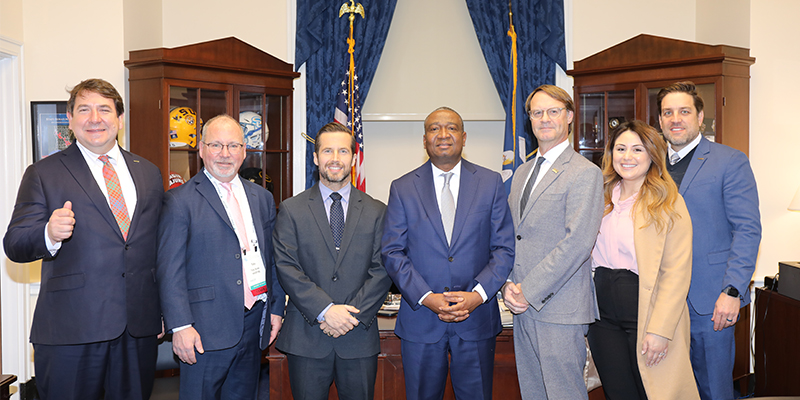NAIOP chapters and members are advancing the interests of commercial real estate within state capitols across the country. Last week, members in North Carolina and Ohio traveled to their respective state capitols to engage lawmakers on solutions to the challenges facing the commercial real estate development industry.
Members from the three North Carolina chapters – Charlotte, North Carolina Piedmont Triad, and Raleigh Durham – met with lawmakers to advance their 2023 Legislative Priorities. This year’s priorities focused on economic development initiatives, tax measures, and regulatory reform to meet the current and future growth challenges within their state.
A top priority for NAIOP of North Carolina is passage of permit reform legislation that reduces inefficiencies and brings more consistency to local permitting processes. The enactment of HB 332/SB 275 will establish a 21-day period for a local government entity to review a permit application. If the local permitting entity is unable to meet this time frame, the applicant may seek approval from a certified third party (engineer) or the Department of Insurance. Other elements of the legislation include:
- During the 21 days, the local entity shall resolve issues associated with the application and may seek additional information from the applicant.
- If additional information is needed or the application must be resubmitted, the permitting entity has 15 days from receipt of the additional information to issue a permit.
- Upon acceptance of a certified approval of an application, the local government shall have 72 hours to issue the permit and refund all applicable fees.
- Upon issuance of the permit based on third-party certification, the local government and inspection department are released from any liabilities, responsibilities or claims arising under this legislation.
In addition to the 2023 Legislative Priorities, North Carolina members also distributed a Permit Reform Flyer to ensure state lawmakers understood the importance of HB 332/SB 275 for commercial development.
An adaptive reuse incentive was also a priority for NAIOP of North Carolina. Their state efforts mirror our advocacy on Capitol Hill in Washington, D.C. Our federal team is currently at the forefront of the debate with members of Congress for the passage of adaptive reuse legislation that incentivizes the conversion of vacant and underutilized office buildings to residential usage. The conversion of vacant office space to residential use will also support local governments in addressing their affordable housing needs.
Adaptive Reuse was a top federal priority during this year’s Chapter Leadership and Legislative Retreat. NAIOP members met with their federal representatives to highlight high office vacancy rates in cities, such as Charlotte, and other communities from new remote and hybrid workplace patterns resulting from the pandemic. These meetings played a pivotal role in advancing the debate on Capitol Hill.
In addition to North Carolina, NAIOP of Ohio hosted a Day at the State Capitol last week as well, one of its largest and most successful. Over 60 NAIOP members from the four chapters – Central Ohio, Cincinnati/Northern Kentucky, Dayton Area, and Northern Ohio – traveled to Columbus to attend the 2023 Legislative Day. Participants heard from J.P. Nauseef, president and CEO of JobsOhio, before heading over to the capitol to advocate on behalf of the development community, job creation, and a quality of life that attracts and retains talent to the state.
The priorities for NAIOP of Ohio focused on the state’s operating budget in providing the necessary funding to meet Ohio’s full economic growth potential. They included the preservation of the state’s historic preservation tax credit and increasing the allocations for the following programs and tax credits:
- Brownfield Remediation Program,
- Building Demolition and Site Revitalization Program,
- Transformational Mixed-Use Development Tax Credit, and
- Opportunity Zone Tax Credit.
NAIOP of Ohio is also supporting passage of HB 237, a bill, according to its summary, that “requires counties to provide an electronic means of recording instruments and of accessing recorded instruments by January 1, 2025.” The legislation would modernize Ohio’s system of recording instruments and streamline the ability to complete real estate transactions online.
NAIOP chapters in North Carolina, Ohio, and other states are having an impact on policy discussions within state capitols. These legislative advocacy days provide important opportunities for state lawmakers to hear directly from NAIOP members and the commercial development community. Engagement in the legislative process ensures the interests of commercial real estate are taken into consideration.








